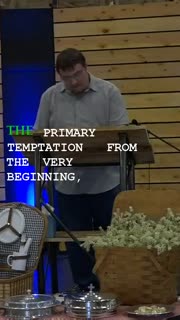Zephaniah: Judgment, Hope, and God's Compassion
Devotional
Sermon Summary
Bible Study Guide
Sermon Clips
### Quotes for Outreach
1. "Yet in the middle of this judgment, there is hope. Hope for Jews and Gentiles alike to be God's people and live with him forever. These themes are similar to the themes of the much longer book of Isaiah, leading John Goldengate to say, Zephaniah is thus a miniature scale equivalent to the book of Isaiah." [21:16] (25 seconds)
2. "We saw this very thing in Jonah a couple of weeks ago. We saw this in Joel last week or two weeks, whatever week it was, two weeks ago. We saw in both of these books, there's a promise that if we would humble ourselves and respond to the Lord and seek him, that God is a God of mercy and compassion." [30:22] (24 seconds)
3. "God alone deserves glory as the creator of all things. He dictates how things are supposed to be. Yet his free creatures have rebelled against him. See, and over and over again, choosing to flirt with other false gods and give their worship to those gods. Absolutely not. If we imagine God as a carpet to walk on and he should just be okay with our sin, then we have greatly misunderstood God." [28:36] (39 seconds)
4. "Sing aloud, O daughter of Jerusalem. Shout, O Israel. Rejoice and be exultant with your hearts, O daughter of Jerusalem. Here, Zephaniah begins to speak of what we know of as the new heaven and the new earth, the new Jerusalem, where we will be able to live in peace with God forever in joy unspeakable and full of glory." [40:33] (20 seconds)
5. "The King of Israel, the Lord, is in your midst. You shall never again fear evil. On that day it shall be said of Jerusalem, Fear not, O Zion, let not your hands grow weak. The Lord God is in your midst. A mighty one who will save. He will rejoice over this. He will quiet you by His love. He will exalt over you with loud singing." [41:12] (23 seconds)
### Quotes for Members
1. "The primary temptation from the very beginning, all the way back in Genesis is, did God really say? Did God really say that if you eat this fruit, God really say that idolatry is all that big of a deal? Did God really say that immorality is all that big of a deal? He's not going to do anything about it. He's been merciful up till now. He hasn't done anything about it yet. It's been 900 years. He hasn't done anything about it yet. So it must be okay." [24:13] (36 seconds)
2. "But no, God sees this sin of complacency and he sees it as an affront to his holiness. And therefore, in verses 14 through 18, he proclaims calamity on these people. He tells them that the day of the Lord is on its way. Verse 14, the great day of the Lord is on its way. Verse 14, the great day of the Lord is on its way. Verse 15, the day of the Lord is near, near and hastening fast. The sound of the day of the Lord is bitter. The mighty man cries aloud there." [25:37] (31 seconds)
3. "The purpose of His judgments is not to alleviate His anger. This isn't just, punch someone so I can calm down type of outburst. Rather, God's purpose for His judgment is found in verses 9 through 10. The purpose is actually to purify the nations. Look at verse 9. For at that time, I will change the speech of the peoples to a pure speech, that all of them may call upon the name of the Lord and serve Him with one accord." [39:24] (29 seconds)
4. "There's joy here because the Lord has removed His judgments. God now calls, calls this united and purified people to sing and rejoice because His judgment is past. There's joy we see here because the Lord is present with His people. In the second half, verse 15, it says, The King of Israel, the Lord, is in your midst. You shall never again fear evil." [41:12] (25 seconds)
5. "For the Christian, the sin you continue to wallow in is serious to the Lord. We were reminded, I know many of you, and we've all probably seen the things that happen at the Olympics and been angered by what we've seen, the mockery of Christianity that has gone on there. One comment, Don, I only bring this one up because it goes along with what we're already talking about. One comment on there says, are you as angry about your own sin?" [42:36] (35 seconds)
Ask a question about this sermon
1. "Yet in the middle of this judgment, there is hope. Hope for Jews and Gentiles alike to be God's people and live with him forever. These themes are similar to the themes of the much longer book of Isaiah, leading John Goldengate to say, Zephaniah is thus a miniature scale equivalent to the book of Isaiah." [21:16] (25 seconds)
2. "We saw this very thing in Jonah a couple of weeks ago. We saw this in Joel last week or two weeks, whatever week it was, two weeks ago. We saw in both of these books, there's a promise that if we would humble ourselves and respond to the Lord and seek him, that God is a God of mercy and compassion." [30:22] (24 seconds)
3. "God alone deserves glory as the creator of all things. He dictates how things are supposed to be. Yet his free creatures have rebelled against him. See, and over and over again, choosing to flirt with other false gods and give their worship to those gods. Absolutely not. If we imagine God as a carpet to walk on and he should just be okay with our sin, then we have greatly misunderstood God." [28:36] (39 seconds)
4. "Sing aloud, O daughter of Jerusalem. Shout, O Israel. Rejoice and be exultant with your hearts, O daughter of Jerusalem. Here, Zephaniah begins to speak of what we know of as the new heaven and the new earth, the new Jerusalem, where we will be able to live in peace with God forever in joy unspeakable and full of glory." [40:33] (20 seconds)
5. "The King of Israel, the Lord, is in your midst. You shall never again fear evil. On that day it shall be said of Jerusalem, Fear not, O Zion, let not your hands grow weak. The Lord God is in your midst. A mighty one who will save. He will rejoice over this. He will quiet you by His love. He will exalt over you with loud singing." [41:12] (23 seconds)
### Quotes for Members
1. "The primary temptation from the very beginning, all the way back in Genesis is, did God really say? Did God really say that if you eat this fruit, God really say that idolatry is all that big of a deal? Did God really say that immorality is all that big of a deal? He's not going to do anything about it. He's been merciful up till now. He hasn't done anything about it yet. It's been 900 years. He hasn't done anything about it yet. So it must be okay." [24:13] (36 seconds)
2. "But no, God sees this sin of complacency and he sees it as an affront to his holiness. And therefore, in verses 14 through 18, he proclaims calamity on these people. He tells them that the day of the Lord is on its way. Verse 14, the great day of the Lord is on its way. Verse 14, the great day of the Lord is on its way. Verse 15, the day of the Lord is near, near and hastening fast. The sound of the day of the Lord is bitter. The mighty man cries aloud there." [25:37] (31 seconds)
3. "The purpose of His judgments is not to alleviate His anger. This isn't just, punch someone so I can calm down type of outburst. Rather, God's purpose for His judgment is found in verses 9 through 10. The purpose is actually to purify the nations. Look at verse 9. For at that time, I will change the speech of the peoples to a pure speech, that all of them may call upon the name of the Lord and serve Him with one accord." [39:24] (29 seconds)
4. "There's joy here because the Lord has removed His judgments. God now calls, calls this united and purified people to sing and rejoice because His judgment is past. There's joy we see here because the Lord is present with His people. In the second half, verse 15, it says, The King of Israel, the Lord, is in your midst. You shall never again fear evil." [41:12] (25 seconds)
5. "For the Christian, the sin you continue to wallow in is serious to the Lord. We were reminded, I know many of you, and we've all probably seen the things that happen at the Olympics and been angered by what we've seen, the mockery of Christianity that has gone on there. One comment, Don, I only bring this one up because it goes along with what we're already talking about. One comment on there says, are you as angry about your own sin?" [42:36] (35 seconds)










